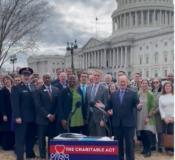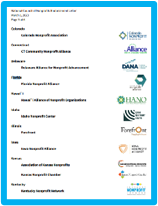
the advocates’ message.
Senators Lankford (R-OK) and Chris Coons (D-DE) have re-introduced their bipartisan Charitable Act (S.566), legislation to create a universal charitable (non-itemizer) deduction. It would provide all taxpayers, not just the wealthy, an extra incentive to support their community by donating to charitable nonprofits. The bill faces an uphill climb in a Congress known primarily for its extreme partisanship, looming fiscal crises and potential government shutdowns, and perhaps historically low expectations of significant accomplishments. The Charitable Act faces truly long odds of passing, so why bother?
The short answer is that in legislative advocacy, doing the same thing over and over isn’t the usual definition of insanity. Rather, it can be a strategy for building momentum that leads to ultimate passage of a law.
As background, the Charitable Act is the fourth iteration of the bill language they proposed in the last three Congresses. The first time arose during the debate over the “Tax Cuts and Jobs Act” in 2017 as the Republican-controlled House and Senate were about to double the standard deduction and thereby limit the itemized charitable deduction to fewer than one-in-eight taxpayers. The next version came in the split 116th Congress (2019-2020) when Democrats controlled the House and Republicans held the majority in the Senate. Pandemic relief included a slim variation on the non-itemizer deduction, originally a $300 deduction for individuals and later a $600 deduction for couples. That provision expired at the end of 2021. In the succeeding 117th Congress (2021-2022), in which both chambers were controlled by Democrats, the bipartisan charitable giving bill saw no action.
In a curious twist of history, the bill now goes before a configuration of Congress – the 118th – that it hasn’t seen before: a Senate controlled by Democrats and a House controlled by Republicans. Without a pandemic spurring action (as occurred in 2020), what hope does the Charitable Act have in a deeply divided and hostile legislature? And again, conventional wisdom will ask, why bother?

First and foremost, the reason for introduction now is tied to the extreme need for additional incentives for individuals to support the work of charitable nonprofits. Nonprofits need more resources as the demand for nonprofit services continues to rise (see Federal Reserve research), inflation in the last two years erased more than 13% of nonprofits’ already razor-thin resources, fierce competition for labor has produced a nationwide nonprofit workforce shortage, and charitable giving by people who donate to small and midsize nonprofits trying to meet local needs plummeted in 2022. As explained in the letter of endorsement from the networks of the National Council of Nonprofits, the 2017 Tax Cuts and Jobs Act clearly accelerated that decline, because when Congress enacted the temporary and small non-itemizer deductions in 2020, 42.5 million more taxpayers participated, generating $10.9 billion in charitable giving that year . The impact of what Senators Lankford and Coons are proposing is unmistakably positive and needed.
Equally compelling is the need for keeping the issue in front of Congress. Passage of the freestanding bill is considered unlikely by many. But the strong, bipartisan support the Charitable Act enjoys disrupts the narrative that Congress can’t get along. The bill boasts 10 cosponsors on the day of introduction. More will surely sign on as charitable nonprofits make their case to their elected officials. Introduction of a companion bill in the House in the coming weeks will provide another very-public opportunity to point to the need and explain how the non-itemizer deduction is the right solution right now.
Finally, introduction of the Charitable Act now lays the groundwork for passage of all or some of the enhanced giving incentives as part of other legislation this year. Charitable nonprofit professionals are optimistic by nature, and advocacy efforts focus on turning challenges into opportunities. When the opportunity breaks open, the Charitable Act will be on the table as a viable option for any legislation that moves. So it is essential that the needs of the community be understood, the legislation be seen, and nonprofit advocates be heard.
